Several tea blends can boost your digestive wellness. A peppermint and chamomile mix soothes your stomach and reduces inflammation. Ginger root combinations, like ginger-lemon or ginger-turmeric, aid digestion and calm discomfort. Fennel and anise seed blends relax your gastrointestinal muscles, easing bloating and gas. Licorice root teas, when combined with herbs like peppermint or ginger, can soothe your stomach lining and ease digestive issues. Lemon balm infusions, especially when mixed with peppermint or chamomile, can calm an upset stomach and reduce bloating. These natural remedies offer a tasty way to improve your gut health and overall digestive comfort. Exploring these blends further can reveal even more benefits for your digestive system.
Peppermint and Chamomile Blend
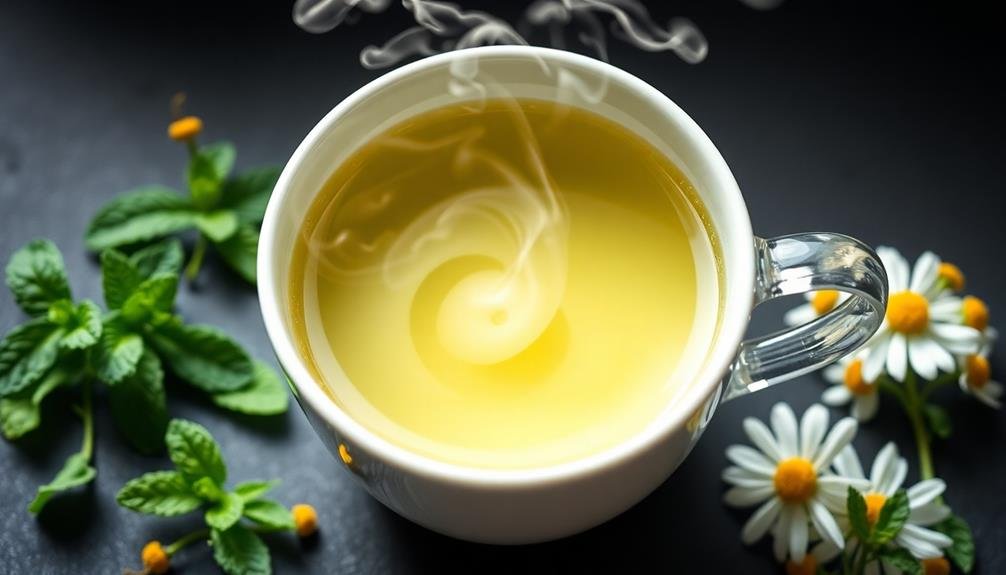
Along with its soothing aroma, a blend of peppermint and chamomile tea offers powerful digestive benefits. This combination targets various digestive issues, making it an ideal choice for those seeking natural relief.
Peppermint, known for its cooling menthol properties, helps relax the muscles of your gastrointestinal tract. This action can alleviate symptoms of indigestion, bloating, and gas. It's particularly effective in reducing abdominal pain and discomfort associated with irritable bowel syndrome (IBS).
Chamomile, on the other hand, contains compounds that can reduce inflammation in your digestive system. It's been shown to soothe stomach aches, reduce acid reflux, and even alleviate nausea. The herb's mild sedative effects can also help you relax, indirectly benefiting your digestion by reducing stress-related digestive issues.
When combined, these two herbs create a synergistic effect. You'll experience enhanced digestive comfort and reduced inflammation throughout your gastrointestinal tract.
To prepare this blend, steep equal parts of dried peppermint and chamomile in hot water for 5-7 minutes. Drink it after meals or before bedtime for best results. Regular consumption can lead to improved overall digestive health and wellbeing.
Ginger Root Tea Combinations
Have you considered harnessing the power of ginger in your digestive wellness routine? Ginger root tea combinations offer a potent blend of flavors and health benefits that can soothe your stomach and improve digestion. You'll find that ginger pairs well with various herbs and spices, creating unique and effective tea blends.
Here are some popular ginger root tea combinations to try:
| Blend | Ingredients | Benefits |
|---|---|---|
| Ginger Lemon | Ginger, lemon | Boosts immunity, aids digestion |
| Ginger Turmeric | Ginger, turmeric | Reduces inflammation, improves digestion |
| Ginger Mint | Ginger, peppermint | Soothes nausea, relieves bloating |
To prepare these blends, steep fresh or dried ginger root with your chosen ingredients in hot water for 5-10 minutes. You can add honey or a natural sweetener to taste. For maximum digestive benefits, drink these teas before or after meals. Remember, consistency is key when incorporating ginger root tea combinations into your wellness routine. You'll likely notice improvements in your digestion and overall gut health with regular consumption.
Fennel and Anise Seed Mix
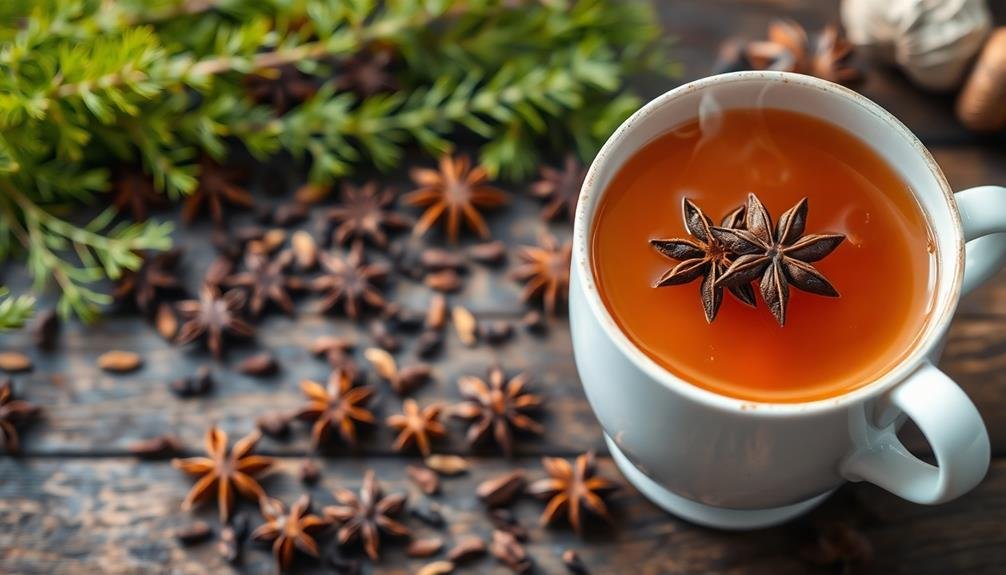
Numerous digestive benefits await you with a fennel and anise seed mix tea. This aromatic blend combines two powerful herbs known for their soothing effects on the digestive system.
Fennel seeds contain compounds that help relax the muscles in your gastrointestinal tract, reducing bloating and gas. Anise seeds, with their licorice-like flavor, aid in relieving indigestion and can help alleviate nausea.
To brew this beneficial tea, simply steep equal parts fennel and anise seeds in hot water for 5-10 minutes. You'll enjoy a flavorful, caffeine-free beverage that can be consumed after meals or whenever you need digestive support.
Here's what you can expect from this potent mix:
- Reduced bloating and gas
- Improved digestion and nutrient absorption
- Relief from stomach cramps and discomfort
- Support for a healthy gut microbiome
- Potential appetite suppression for weight management
Regular consumption of fennel and anise seed tea may also contribute to overall gut health, potentially reducing inflammation in your digestive tract.
It's a natural and gentle way to support your digestive wellness without relying on over-the-counter medications. Remember to consult with your healthcare provider before adding any new herbal remedies to your routine, especially if you have existing health conditions or are taking medications.
Licorice Root Digestive Blends
Licorice root stands out among digestive herbs for its versatility and potency. It's known for soothing the stomach lining and easing digestive discomfort. When you're looking to create a licorice root digestive blend, you'll want to pair it with complementary herbs that enhance its effects.
Consider combining licorice root with peppermint for a cooling, calming effect on your digestive system. Ginger adds a warming element that can help stimulate digestion and reduce nausea. For a more balancing blend, try adding chamomile or lemon balm, which can help reduce stress-related digestive issues.
Here's a quick guide to creating your own licorice root digestive blends:
| Base Herb | Complementary Herb | Benefits |
|---|---|---|
| Licorice Root | Peppermint | Cooling, calming |
| Licorice Root | Ginger | Warming, anti-nausea |
| Licorice Root | Chamomile | Stress-reducing |
| Licorice Root | Lemon Balm | Calming, mood-lifting |
| Licorice Root | Fennel | Gas-relieving, soothing |
Remember to use licorice root in moderation, as excessive consumption can lead to side effects. If you have high blood pressure or other health concerns, consult your healthcare provider before incorporating licorice root into your diet regularly.
Lemon Balm Tea Infusions
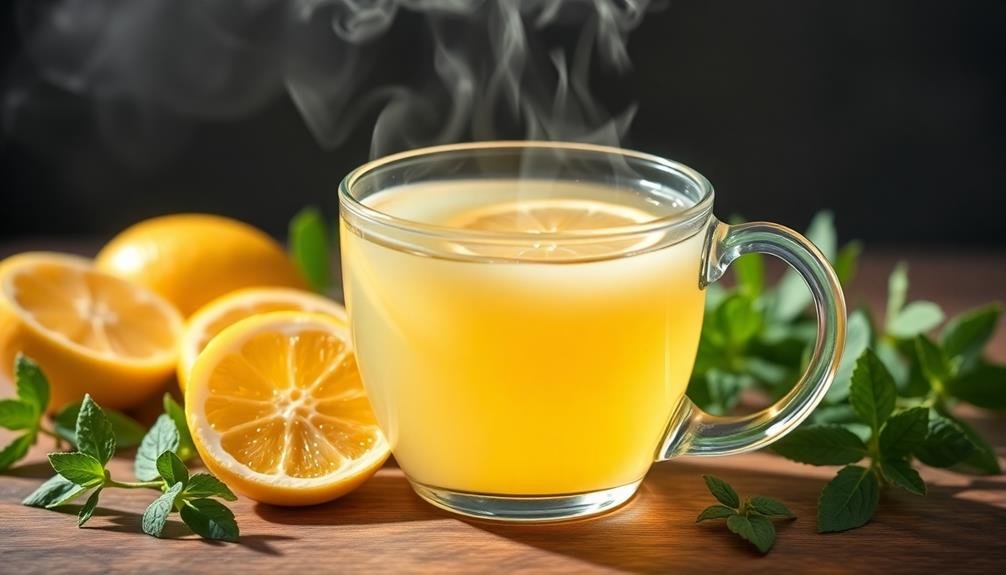
Lemon balm, a gentle yet powerful herb, offers a soothing approach to digestive wellness. This aromatic member of the mint family can help calm an upset stomach, reduce bloating, and ease indigestion. You'll find that incorporating lemon balm tea infusions into your daily routine can greatly improve your digestive comfort.
To create a lemon balm tea infusion, steep 1-2 teaspoons of dried lemon balm leaves in hot water for 5-10 minutes. You can enhance its benefits by combining it with other digestive-friendly herbs. Here are some popular lemon balm tea blends:
- Lemon balm and peppermint for gas relief
- Lemon balm and chamomile for relaxation
- Lemon balm and ginger for nausea
- Lemon balm and fennel for bloating
- Lemon balm and licorice root for overall digestive support
Drink these infusions 15-30 minutes before meals to prepare your digestive system. You can also enjoy a cup after dinner to aid digestion and promote relaxation.
Frequently Asked Questions
How Long Should I Steep Digestive Tea Blends for Optimal Benefits?
You'll want to steep digestive tea blends for 5-10 minutes to extract ideal benefits. Don't oversteep, as it can make the tea bitter. Adjust steeping time based on your taste preferences and the specific blend you're using.
Can I Drink These Teas Daily, or Should I Limit Consumption?
You can drink digestive teas daily, but it's best to listen to your body. Don't overdo it; 1-3 cups a day is generally safe. If you notice any adverse effects, reduce consumption or consult your healthcare provider.
Are There Any Potential Side Effects of Drinking Digestive Tea Blends?
While digestive tea blends are generally safe, you might experience side effects like bloating, gas, or diarrhea if consumed in excess. Some herbs can interact with medications, so it's best to consult your doctor before regular use.
Can I Add Sweeteners to These Teas Without Reducing Their Digestive Benefits?
You can add sweeteners to digestive teas, but it's best to use natural options like honey or stevia. They won't greatly reduce the benefits. However, limit added sugars as they may counteract some of the tea's digestive properties.
Are These Tea Blends Safe for Pregnant or Breastfeeding Women?
You should consult your healthcare provider before consuming any herbal teas while pregnant or breastfeeding. Some herbs can be unsafe during these periods. It's best to err on the side of caution and get professional advice.
In Summary
You've now discovered several tea blends that can boost your digestive wellness. Whether you're sipping on peppermint and chamomile, ginger root combinations, fennel and anise seed mix, licorice root blends, or lemon balm infusions, you're taking a delicious step towards better gut health. Remember, these teas aren't just tasty; they're powerful natural remedies. Experiment with different blends to find what works best for you. Incorporate these teas into your daily routine, and you'll likely notice improvements in your digestive comfort.

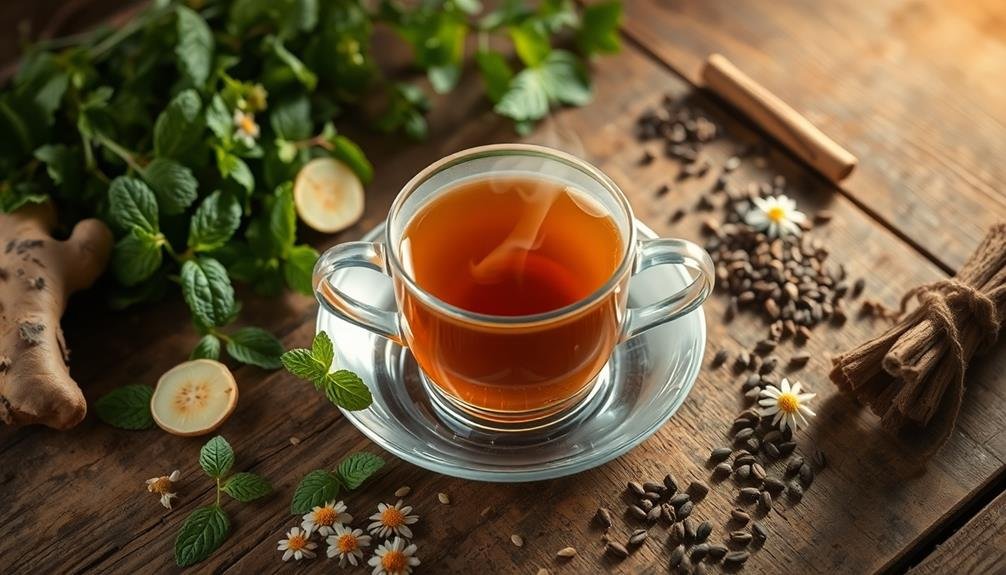
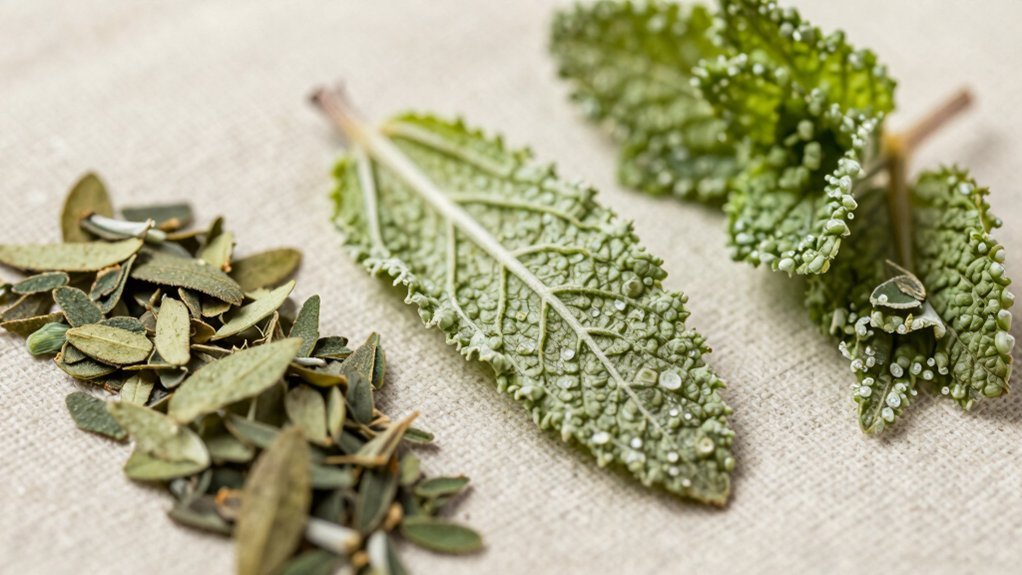

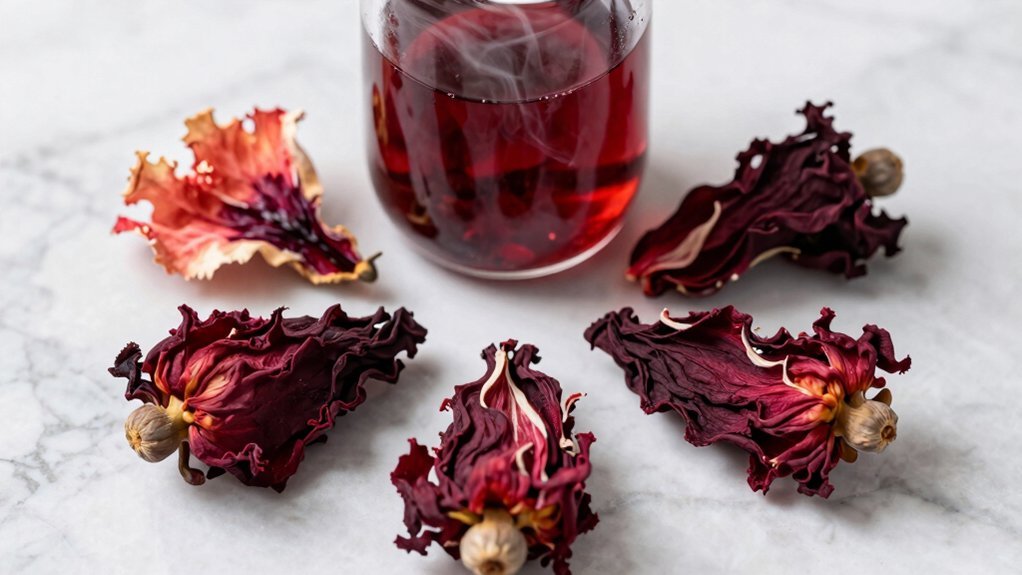
Leave a Reply